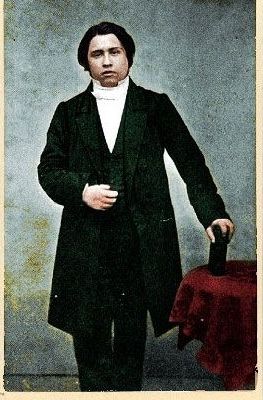Ancestry And Genealogy
I sing of the noble Refugee,
Who strove in a holy faith,
At the altar of his God to bow,
When the road was marked with death.
When the despot’s sword and the bigot’s torch
Had driven him forth to roam,
From village, and farm, and city, and town,
He sought our Island Home.
And store of wealth and a rich reward
He brought in his open hand,
For many a peaceful art he taught,
Instead of the fireman’s brand.
Dr. Byles.

MR. SMILES, one of the ablest authors of our time, has produced a work upon the Huguenots, which is not only intensely interesting in its style, but of the utmost importance in its subject. It should be read carefully by every statesman in Europe, especially by those who entertain a lingering love to persecution for righteousness’ sake, for beyond anything else in print it illustrates the great fact that the oppression of the conscience is an injury to the State, — an injury not only to its mental and moral health, but to its material prosperity.

We were not aware that our little isle, the asylum of the banished, had received so great a reward for the entertainment of the Lord’s exiles. We knew that they had brought with them many of our most lucrative trades, but we had no idea of the great extent of the boon. England must have been a poor land until, in entertaining strangers, she entertained angels unawares. We are certainly a very singular race; the Huguenot blood has had more to do with us than many suppose; let us hope that, by God’s grace, enough of the characteristics of these good men may be found among us to keep us from drifting utterly to Rome and perdition. If England’s opening her gates to receive the hunted Protestants of the Continent may be rewarded, in our day, by a revival of the brave spirit which they brought with them, it would be a blessing from the Lord’s own right hand.
Many of the Flemish, Dutch, and French Protestants, driven by persecution out of their native country, found a haven of refuge in England; and, naturally, great numbers of them settled down in the Southern and Eastern Counties, though others journeyed to the Midlands, and the North and West of England, and some went as far as Scotland and Ireland. Mr. Smiles says that “Colchester became exceedingly prosperous in consequence of the settlement of the Flemish artisans there. In I609, it contained as many as 1,300 Walloons and other persons of foreign parentage.” He also mentions that, in many towns, where the refugees fixed their abode, “the artisans set up their looms, and began to work at the manufacture of sayes, bayes, and other kinds of cloth, which met with a ready sale.” This information is very interesting to me, for in my early days in Essex I used to hear a great deal about “the bay and say industry.” I daresay our fathers were poor weavers, but I had far rather be descended from one who suffered for the faith than bear the blood of all the emperors within my veins. I remember speaking with a Christian brother, who seemed right happy to tell me that he sprang of a family which came from Holland during the persecution of the Duke of Alva, and I felt a brotherhood with him in claiming a like descent from Protestant forefathers.
One namesake, and perhaps an ancestor, Job Spurgeon, of Dedham, had to suffer both in purse and in person, “for the testimony of a good conscience,” as the Quaker record puts it. In 1677, a distress was levied upon him, and some of his goods were seized, because he had committed the atrocious crime of attending a Nonconformist meeting at Dedham! Six years later, for a similar offense, he and three other godly men “were required to give sureties for their good behavior, which refusing to do, they were re-committed to prison, where three of them lay upon straw about fifteen weeks in the midst of a winter remarkable for extremity of cold; but the fourth, Job Spurgeon, being so weak that he was unable to lie down, sat up in a chair the most part of that time.” In my seasons of suffering, I have often pictured to myself this modern Job in Chelmsford gaol, and thanked God that I bore the same name as this persecuted Spurgeon of two hundred years ago.

So far as I can make out the genealogy, it appears to me that this Essex Quaker was my great-grandfather’s grandfather, and I sometimes feel the shadow of his broad brim come over my spirit. Grace is not tied to families, but yet the Lord delights to bless to a thousand generations. There is a sweet fitness in the passing on of holy loyalty from grandsire to father, and from father to son. I like to feel that I serve God “from my fathers.” I can cast my eye back through four generations, and see that God has been pleased to hear the prayers of our grandfather’s father, who used to supplicate with God that his children might live before Him to the last generation; and God has never deserted the house, and has been pleased to bring first one and then another to fear and love His name. I was amused when I read that a friend in China wrote concerning my name: — “The Chinese cannot pronounce ‘Spurgeon’ correctly, so we call him in this quarter, ‘Sze-Pah-ng,’ i.e., ‘the successor or continuator of a hundred virtues.’ The word ‘hundred’ in Chinese stands for an indefinite number.” My godly ancestors possessed many more than a hundred virtues; and I am very grateful to God for the grace which has enabled me to be the continuator of any of them.

I notice how very particular the Holy Ghost is that a good man should not be confounded with a bad one. He says, when mentioning one of the twelve, — “Judas… not Iscariot” (John 14:22). There were two apostles of the name of Judas; the one who betrayed our Lord, and the other who wrote the Epistle of Jude, who should properly have been called Judas. Some of us, in reading the name Judas, might have said, “Ah! it was that traitor Judas Iscariot who asked the question.” But the Holy Spirit would not allow this mistake to be made. This should teach us that it is not an idle wish for us to desire that our name should be handed down to posterity untarnished. We ought all to seek to have an unblemished character; we ought to desire to have that promise fulfilled, “The memory of the just is blessed.” I would not like my name to be mistaken for that of some criminal who was hanged. I would not wish to have my name written even by mistake in the calendar of infamy. However much I may now be misrepresented, it will one day be known that I have honestly striven for the glory of my Master.
My second Christian name — Haddon — has often reminded me of my godly ancestry. When I have had to endorse a great heap of checks for the College and Orphanage, I have wished that my father had not given me so many initials, and I took care that my own sons should not have the same cause for complaint, for they are simply “Charles” and “Thomas.” Yet there is such a pleasing story associated with the name of “Haddon” that I am very glad it was given to me. It appears that, before my grandfather became a minister, he had several years of business life as a country shop keeper. Amongst other things, he sold cheese, which he used to buy of a wholesale dealer in that useful article of commerce.
One day, a friend, named Haddon, said to him, “Mr. Spurgeon, you should go down to the cheese fairs at Derby and Leicester, and buy what you want at first hand; you would get a much larger profit if you did so.” “Oh!” replied grandfather, “I could not do that, for I have not sufficient money to spare for such a purpose.” “You need not have any difficulty on that score,” said the generous man; “if you tell me when the next fair is to be held, I will let you have the money, and you can pay me back when you have sold the cheese. I have such confidence in your Christian integrity, that I shall be glad to aid you in this way.”

Accordingly, grandfather bought the cheese, sold them at a good profit, and went to his friend who had lent him the money. This is one of the most remarkable parts of the story. When the amount was repaid, grandfather asked how much interest was due from him; but the lender replied, “Oh, Mr. Spurgeon, that is not my way of transacting business! I had that money lying idle, and you have done me great service in putting it to such good use, so I mean to give you five percent, for your trouble in laying it out for me; and when the season comes round again, I want you to buy another lot of cheese on the same terms.”

That very singular arrangement was continued until there was no further need of the good man’s help; and, afterwards, when grandfather had a son born to him, he gave him the name of “Haddon” in remembrance of his generous friend. That son was my Uncle Haddon, who, in my childhood days, used to give out the hymns at Stambourne Meeting-house; and when my father also had a son, he gave him the name of Charles HADDON Spurgeon; and now, without any wish on my part, Mr. William Olney and his friends in Bermondsey have perpetuated the name by calling their splendid mission premises “Haddon Hall.” It always seems to me that this chain of circumstances is a fresh illustration of the inspired promise, “The righteous shall be in everlasting remembrance.”
